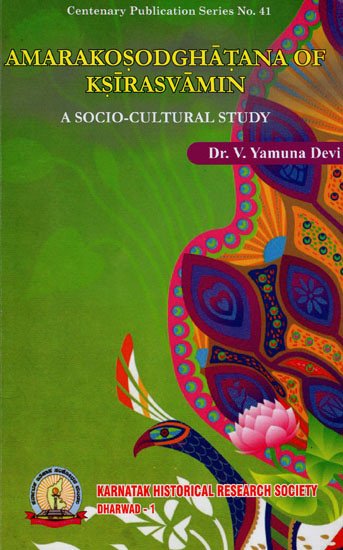Amarakoshodghatana of Kshirasvamin (study)
by A. Yamuna Devi | 2012 | 77,297 words | ISBN-13: 9788193658048
This page relates ‘Economics (2): Banking’ of the study on the Amarakoshodghatana of Kshirasvamin (in English) which represents a commentary on the Amarakosha of Amarasimha. These ancient texts belong the Kosha or “lexicography” category of Sanskrit literature which deals with the analysis and meaning of technical words from a variety of subjects, such as cosmology, anatomy, medicine, hygiene. The Amarakosa itself is one of the earliest of such text, dating from the 6th century A.D., while the Amarakoshodghatana is the earliest known commentary on that work.
Economics (2): Banking
The terms enumerated in Amarakośa regarding usury represents the early banking system that prevailed at his times.
(a) Upanidhi (II.9. 81; p. 218)–
[Deposit:]
Amarakośa gives upanidhi and nyāsa as terms denoting a deposit. Kṣīrasvāmin adds nikṣepa as another synonym. He also quotes Yājñavalkyasmṛti (II. 65) which brings out the differences in the nature of the deposits represented by these terms. A ccording to Yājñavalkyasmṛti, upanidhi means a deposit of a sealed object with cloth with another person without disclosing the object within.
While nyāsa is to proclaim the object deposited thus and nikṣepa is the object deposited with the skilled artisan for repair:
nikṣepo'pi | smārte tveṣāṃ bhedo'sti—
vāsanasthamanākhyāya haste'nyasya yadarpyate |
dravyamupanidhirnyāsaḥ prakāśya sthapitam yat |
śilpihaste tu nikṣepo bhāṇḍaṃ saṃskartumarpitaṃ |
dravyaṃ tadaupanidhikaṃ pratideyaṃ tathaiva tat |
(b) Pratidānam (II. 9. 81; p. 218)–
[Return of deposit:]
Kṣīrasvāmin explains pratidānam as the return of the deposit to the depositor.
He also observes that some denote it as paridānam:
tasya nyāsasya nikṣeptre pratīpaṃ dānaṃ pratidānaṃ paridānamityeke |
(c) Arthaprayoga (II. 9. 4; p. 201)–
Amarakośa gives words denoting an usury–arthaprayoga, kusīda and vṛddhijīvika and from explanation of the word vṛddhijīvika one can infer that interest was charged, but Kṣīrasvāmin remark’s collecting such interest was an act of contempt–
vṛddhiṃ garhyāṃ prayacchati vārdhūṣikaḥ |
Kṣīrasvāmin also adds vṛddhyājīva and dvaiguṇika to denote an usury signifying one who lives on interest.
He further mentions that the interest is vṛddhi, lābha or kalāntara–
vṛddhirlābhaḥ kalāntaram |
The rate of interest or other details are not mentioned.
Amarakośa mentions synonyms of usurer kusīdika, creditor–uttamarṇa and debtor–adhamarṇa.
